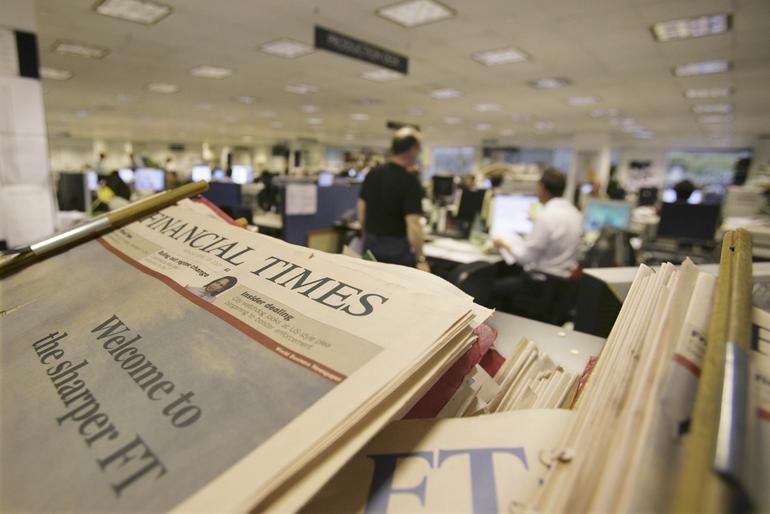
The Financial Times‘s global expansion strategy has lured European business leaders away from rival papers such as the Wall Street Journal and International Herald Tribune, according to a new study published today by market research firm Ipsos.
The BE: Europe report found evidence of an overall rise in international newspaper and magazine readership among the senior decision-makers in 17 European countries who took part in the survey, with the FT, the Economist and BBC.co.uk among the most popular news sources.
The Financial Times was the most-read international business newspaper with 14.3 per cent of respondents claiming to read it regularly – up from 13.1 per cent when the survey was last conducted in 2006.
The number of business leaders visiting the FT.com website rose from 9.2 per cent to 10.3 per cent since 2006. The site’s audience was half that of BBC.co.uk, which recorded a reach of 20.8 per cent compared with 17.6 per cent two years ago.
Readership of the Wall Street Journal Europe, which was bought by Rupert Murdoch as part of his purchase of Dow Jones last year, fell from 2.8 per cent to 2.4 per cent. The International Herald Tribune, the international edition of the New York Times, lost a third of its readership – down from 2.5 per cent to 1.8 per cent.
Financial Times publisher Pearson has been steadily selling its interests in European business newspapers to make way for the FT to grow into a global brand.
Earlier this year, it sold its 50 per cent stake in German title FT Deutschland for an undisclosed sum. It has also offloaded stakes in Spanish business title Expansion and French financial newspaper group Les Echos.
In the weekly magazine market, The Economist saw a 17 per cent rise in readership among businesspeople, up from 10.5 to 12.3 per cent since 2006. Time rose from 6.1 to 6.7 per cent, at the expense of rivals BusinessWeek and NewsWeek, both of which fell slightly.
For the first time, the Ipsos survey – which has been running since 1973 – also collected information on how business executives use the internet, email, podcasts and blogs as sources of news.
Seven in ten respondents said they regularly received news updates online and half said they received a daily email newsletter. Almost a third had downloaded and listened to a podcast, and about a quarter said they regularly read blogs.
Ipsos Media associate director Mette Petersen said: “What we are seeing is a desire for richer sources of knowledge and business information drawn from print, television and online.”
Daily newspapers (with average per-issue readership among business elite)
Financial Times – 14.3%
Wall Street Journal Europe – 2.4%
International Herald Tribune – 1.8%
USA Today – 1.7%
Weekly magazines
The Economist – 12.3%
Time – 6.7%
BusinessWeek – 4.3%
NewsWeek – 4.2%
TV news channels (weekly reach among business leaders)
CNN International – 13.1%
Sky News – 12.4%
BBC World News – 7.1%
Websites (monthly reach among business leaders)
BBC.co.uk – 20.8%
FT.com – 10.3%
CNN.com – 7.7%
Skynews.com – 6.8%
Bloomberg.com – 5.3%
Email pged@pressgazette.co.uk to point out mistakes, provide story tips or send in a letter for publication on our "Letters Page" blog
